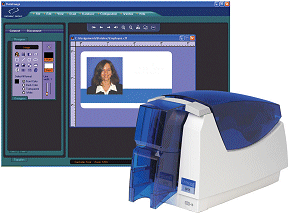 With the sharp decline in card printer prices, companies of all sizes are opting to produce their own cards, while resellers have to differentiate themselves in more innovative ways.
With the sharp decline in card printer prices, companies of all sizes are opting to produce their own cards, while resellers have to differentiate themselves in more innovative ways.
ID card printers have never been so affordable and easy to use. End users no longer consider these machines as high-end investments suitable only for the largest enterprises; instead, they are categorised as another item of office equipment, along with the inkjet printer and photocopy machine.
It is no wonder: even desktop models nowadays provide professional-looking, reasonably secure cards on the spot. Coupled with a card personalisation software package and a photo capture device as basic as a web cam, companies of all sizes can produce their own cards at relatively little cost. From club membership and point-of-sale loyalty to sporting event access and even passenger ID on cruise liners, the sharp drop in card printer costs has triggered increased usage across all industries and all applications.
"The increasing popularity of in-house card printing for low-end applications has implications for card printer resellers."
The market for high-end card applications-such as access control, workstation log-on, time recording, national ID and border control-remains relatively unchanged. Some large enterprises, or those with sensitive security, continue to buy cards printed, personalised, encoded, encrypted and ready to use. Those who prefer to produce their own cards use advanced printers which offer secure features such as chip encoding, UV printing and hologram application.
The increasing popularity of in-house card printing for low-end applications has implications for card printer resellers. Price is no longer the main differentiator. What matters now is added value. This means ancillary productsinput devices, card personalisation software, consumables, accessories, the cards themselves and, of course, warranties, guarantees, training, service and support.
Some companies are offering end users free entry-level card printing software with upgrade paths to fully-featured software as their business grows and their security needs increase. Even smaller businesses are  starting to recognise the value of this kind of software throughout their enterprise. After all, the data captured, including personal information, access rights and ID photo, can also be used centrally by other departments like marketing and human resources.
starting to recognise the value of this kind of software throughout their enterprise. After all, the data captured, including personal information, access rights and ID photo, can also be used centrally by other departments like marketing and human resources.
Complementary products such as card holders and lanyards also make a reseller more attractive to some kinds of end users. Events organisers in particular often look for branded products, preferably from the same source. While they prefer to retain control of the card personalisation process, for marketing and pre-registration, they will also need branded lanyards, vinyl pouches, pre-printed card inserts and even parking permits or vehicle passes. Such businesses with complex logistics will look for suppliers which make their task easier, rather than shop around to save pennies.
"some printer manufacturers are adopting RF technologies within the ribbon spools which tell the printer driver what ribbon is installed"
Anyone selling card printers will sell cheap, off-the-shelf PVC cards. Few, however, offer a choice of services, materials and integrated features. While printer ribbons remain a relatively high running expense, pre-printing cards with corporate graphics and other static data will be of great value to end users. Incorporating reading technologies such as magnetic stripes and smart chips is another feature which adds much value, whether used immediately or in preparation for future expansion.
On the subject of ribbons, some printer manufacturers are adopting RF technologies within the ribbon spools which tell the printer driver what ribbon is installed and ensuring that only the manufacturers own ribbons can be used with their printers. This could lead to configuring the printer to use only particular encoded ribbons from the reseller, thereby ensuring future revenue. Locking in end users in such a way, however, will only backfire in the long term, as past experience clearly shows in any field of IT.
Finally, it also comes down to that all-time favourite: service. A card printer is, after all, a piece of hardware that needs to be maintained. Warrantieson the printer as well as the printheadand repair and maintenance contracts are essential. Maintenance personnel need to be trained and accredited by the various printer manufacturers. And, card template design and staff training all help to get the end user up and running.
While cost will always be a factor, the growing range and scope of low-cost card printers will have end users making their choice of supplier using different criteria. That, in turn, will bring out the best in card printer resellers in terms of offering better service and greater choice.
Charles Balcomb has been involved in the manufacture and application of identity cards and ID systems since 1981. He has worked on many new ID card developments, with an emphasis on the introduction of recyclable and durable cards into the market. His goals are to keep the Group at the forefront of technology, to research and implement innovative card products and solutions, to expand Databac's global reach and generally to fulfil Databac's mission of providing "complete solutions for identification".

Add a Comment
No messages on this article yet